Graduate Studies Overview
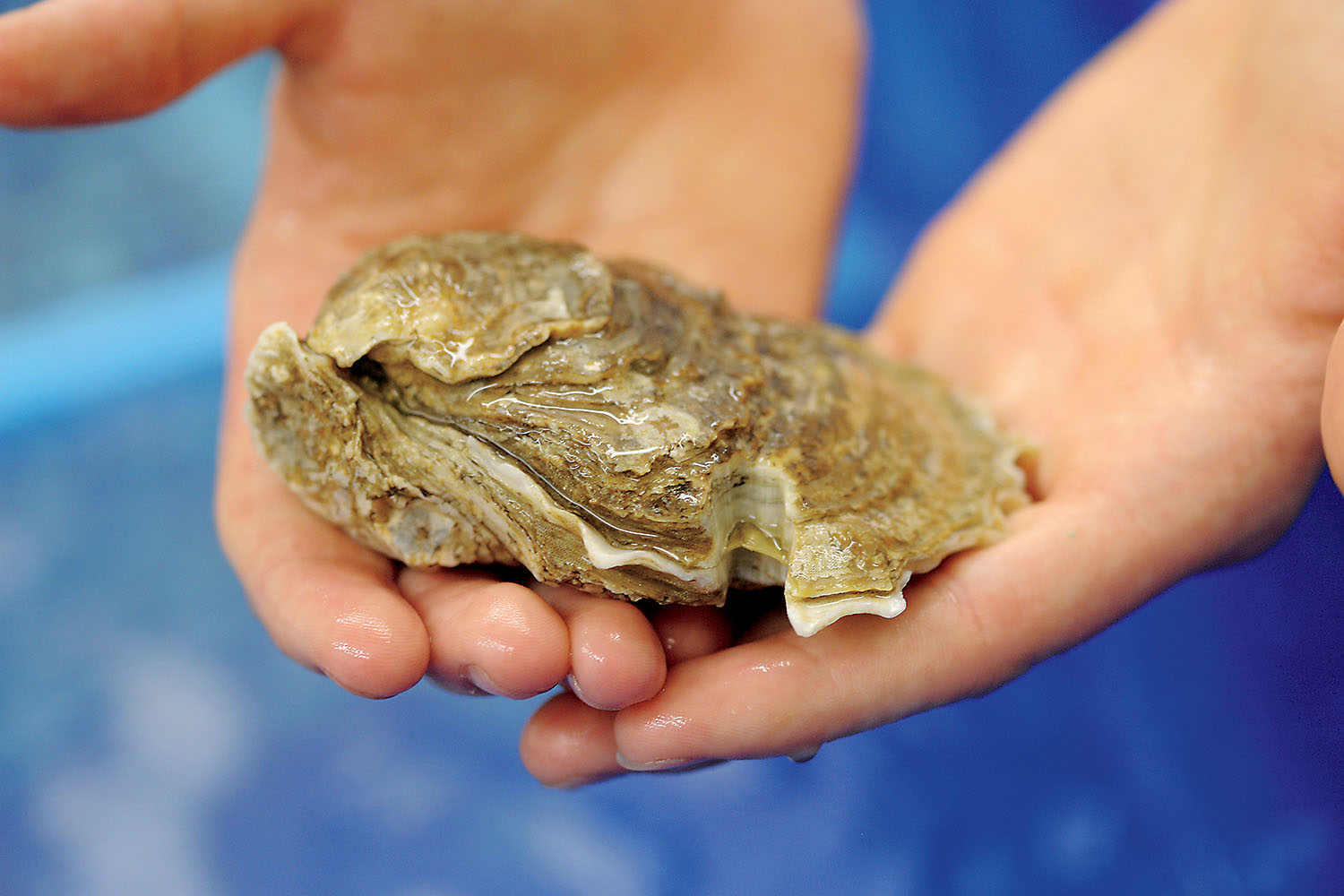 The Department of Biological Sciences at Clemson University offers M.S. and Ph.D. degrees in biological sciences, environmental toxicology and microbiology.
The Department of Biological Sciences at Clemson University offers M.S. and Ph.D. degrees in biological sciences, environmental toxicology and microbiology.
An online M.S. degree, designed specifically for teachers and other science educators interested in biological sciences, is also available.
The goals of our programs are to develop scientists with:
- Broad knowledge in biological sciences.
- Expertise in a specific research area.
- Critical thinking.
- Communication skills.
The Clemson Difference
Mentoring
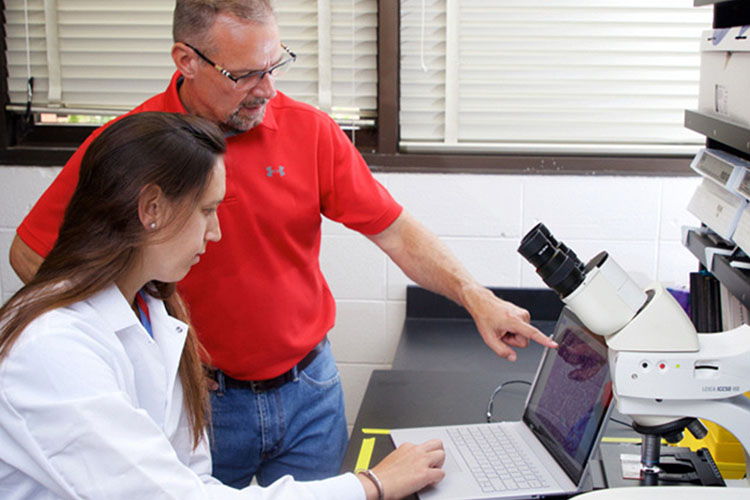
Graduate students in the Department of Biological Sciences receive training from their advisor and their committee, who are chosen from faculty members within and outside our department.
Research
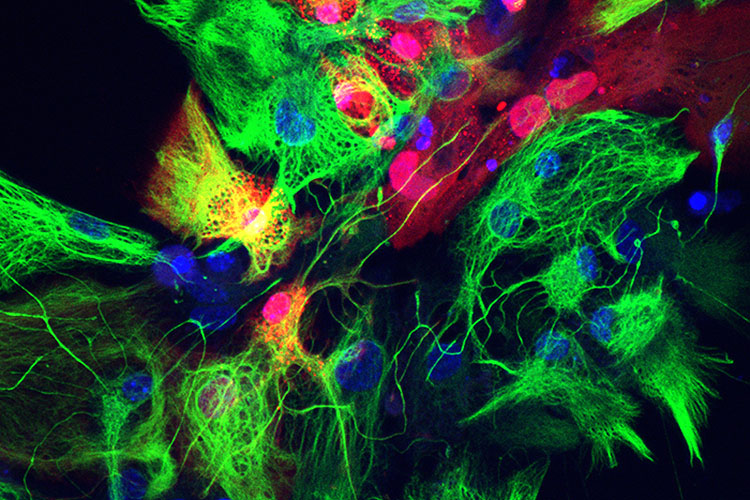
Biological sciences is a broad, interdisciplinary field that joins many elements within the life sciences. Our graduate programs in biological sciences, environmental toxicology and microbiology represent that scope, with opportunities for innovative, collaborative research.
Course Breadth
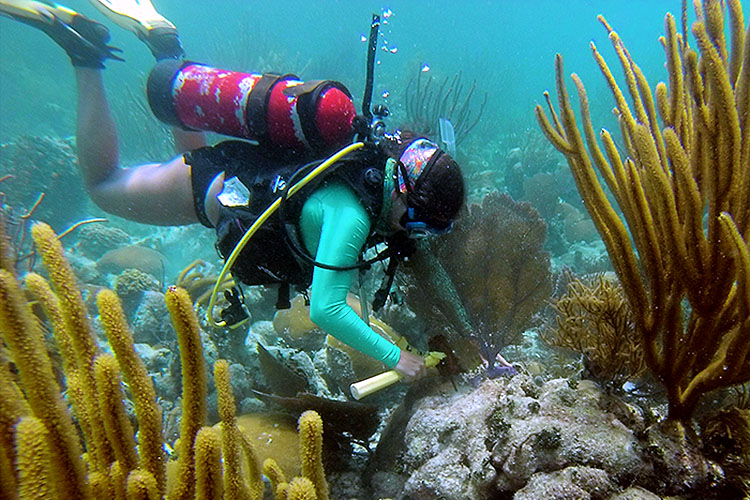
Class offerings within the department reflect the breadth of our faculty’s expertise, including courses in microbiology, cell biology molecular biology, evolution, ecology and organismal biology. Students can pursue individualized degree plans that best suit their career goals.
Development
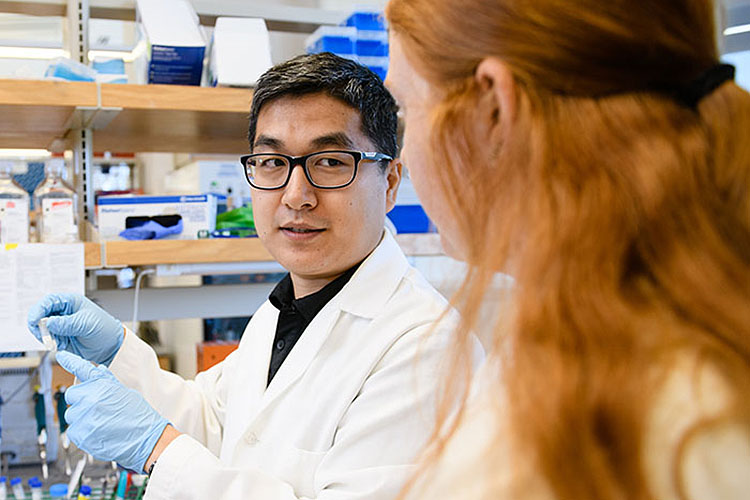
Our program facilitates a broad education including skills in communication, writing, research, data analysis and teaching. Whether writing a grant, presenting at a scientific conference, designing an experiment or teaching undergraduate students, our faculty members mentor graduate students, passing along the skills they need to get the careers they want.
Financial Support
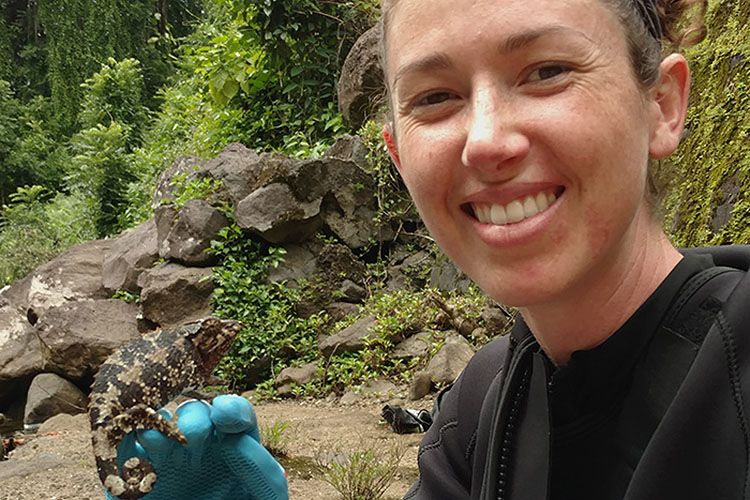
Both teaching and research assistantships are available to support graduate students in the biological sciences, environmental toxicology or microbiology graduate programs. While there are no assistantships available for the online M.S. in biological sciences for science teachers, financial aid is an option offered through the Office of Student Financial Aid.
Community
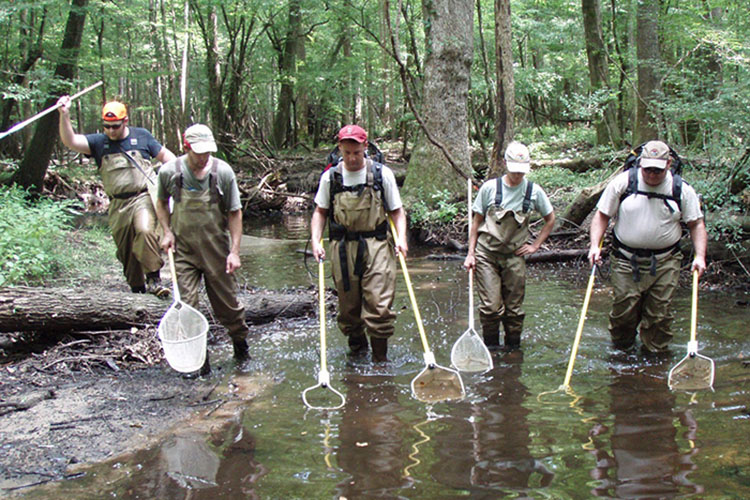
The people you meet and the connections you make as a graduate student are often as important as your time in the lab or field. Our seminars, reading groups and organizations, such as the Biological Sciences Graduate Student Association, exist to bring students together.
Learn more about our graduate student organizations in the resources section below.
Graduate Degree Options
Biological Sciences
The department offers M.S. and Ph.D. degrees in biological sciences. Graduate students in biological sciences craft an individualized plan of study with coursework and research areas that encompass the breadth and depth of life sciences.
Environmental Toxicology
The department offers M.S. and Ph.D. degrees in environmental toxicology. Graduate students in environmental toxicology craft an individualized plan of study with training in interdisciplinary fields across biology, toxicology, environmental chemistry and statistics.
Microbiology
The department offers M.S. and Ph.D. degrees in microbiology. Graduate students in microbiology craft an individualized plan of study with coursework and research areas that encompass the broad range of microbiology from environmental to infectious disease and health.
Online M.S. for Science Educators
The Department of Biological Sciences offers an online, non-thesis M.S. degree in biological sciences for science educators. Two academic paths are offered: one for advanced students not seeking additional degrees, and one for students wishing to attain a non-thesis M.S. in biological sciences.
Resources for Graduate Students
-
Graduate Program Contacts
To find out more about these programs, contact graduate coordinators:
- BIOLOGICAL SCIENCES — Chris Parkinson: biolgrad@clemson.edu
- ENVIRONMENTAL TOXICOLOGY — Bill Baldwin: entoxgrad@clemson.edu
- MICROBIOLOGY — Zhicheng Dou: micrograd@clemson.edu
- ONLINE M.S. IN BIOLOGICAL SCIENCES FOR SCIENCE EDUCATORS — Robert Ballard: biologyonline@clemson.edu
-
Graduate Advisory Commitee
The current Graduate Advisory Committee members are:
- Graduate program coordinator for biological sciences: Chris Parkinson
- Graduate program coordinator for microbiology: Zhicheng Dou
- Graduate program coordinator for environmental toxicology: Bill Baldwin
- Biological sciences faculty representatives: Sam Price and Jason Fridley
- Microbiology faculty representatives: Emily Rosowski and Vince Richards
- Environmental toxicology faculty representative: Lisa Bain
-
Graduate Student Guides
Graduate Student Guides for the Department of Biological Sciences for the last several years can be found below as viewable/downloadable PDFs. For the most up-to-date information, please consult the most recent one. For older guides, contact the Department of Biological Sciences directly.
-
Rubric Forms
The following forms are available as viewable/downloadable PDFs:
- Rubric for Assessing Student Learning Outcomes: Biological Sciences — M.S. Defense
- Rubric for Assessing Student Learning Outcomes: Microbiology — M.S. Defense
- Rubric for Assessing Student Learning Outcomes: Environmental Toxicology — M.S. Defense
- Rubric for Assessing Student Learning Outcomes: Biological Sciences — Ph.D. Comprehensive Exam
- Rubric for Assessing Student Learning Outcomes: Microbiology — Ph.D. Comprehensive Exam
- Rubric for Assessing Student Learning Outcomes: Environmental Toxicology — Ph.D. Comprehensive Exam
- Rubric for Assessing Student Learning Outcomes: Biological Sciences — Ph.D. Dissertation and Defense
- Rubric for Assessing Student Learning Outcomes: Microbiology — Ph.D. Dissertation and Defense
- Rubric for Assessing Student Learning Outcomes: Environmental Toxicology — Ph.D. Dissertation and Defense
-
Proposals, Final Defense, Thesis
Scheduling a Proposal or Final Defense
Proposals and final theses/dissertations must be provided to committee members at least 14 days in advance of the defense. All proposal defenses should be advertised at least 10 days beforehand by sending a flyer to your advisor, committee members and the graduate student services program coordinator. The program coordinator will then forward it to the faculty and graduate students. All final defenses should be announced at least 10 days beforehand by filling out the Submit Defense Form and sending an email to your advisor, committee members and the graduate student services program coordinator. The program coordinator will then forward it to the faculty and graduate students. Further instructions are in the most recent Graduate Student Guide in sections VII and VIII.
Binding Thesis/Dissertation
In addition to the electronic copy of your thesis/dissertation document required by the Graduate School, the microbiology and biological sciences graduate degree programs require one bound copy of your thesis/dissertation paid for by the department for the departmental library collection of theses/dissertations located in 229 Long Hall. A signature page from your advisory committee (not available in the electronic copy) can be included in the bound copy, and there is an option to print your figures in color. The department will pay for up to two copies (one for the program, one for the student) to be bound. Please contact the graduate student services program coordinator, for instructions.
-
The Graduate School
Current graduate students may find the following links containing University policies helpful:
- “Clemson University Graduate School Policies & Procedures” handbook
- The Graduate School
- Graduation deadlines
- Graduate School forms
For general information about the Clemson University Graduate School, as well as the most current degree requirements and course listings, visit the Records and Registration page.
-
Clemson Life
Study under faculty dedicated to excellence. Learn as part of a close-knit graduate community. Your time in graduate school will be a time of intense professional development, and it will be a life phase that you will never forget. This section provides information on important issues that relate to your Clemson biological sciences graduate student experience. Of course, it’s impossible to anticipate all of the issues that might arise, so contact the department if you have questions.
Housing
Most graduate students select off-campus housing, for which a variety of options in many cost ranges are available within a short walk or drive from campus. Clemson has an excellent free local bus system that provides frequent service to most local apartment complexes and campus buildings. Information about housing is also available on the Clemson Home website.
Insurance and Health Services
Clemson University requires all full-time (nine hours or more), on-campus graduate students to have health insurance coverage. All international graduate students are required to have health insurance. This policy is administered by Redfern Health Center as a “hard-waiver program.” All full-time, on-campus students are enrolled in the University plan unless they present evidence of acceptable alternative coverage to RHC’s Office of Student Insurance before the semester begins. One waiver is valid for a year. To partially offset some of the health insurance premium costs associated with this requirement, Clemson provides all graduate assistants who purchase health insurance from Clemson with an annual, nonrefundable, non-transferable health insurance subsidy.
Find out more on the Redfern Health Center website.
Local and Regional Resources
For additional information on Clemson and Upstate South Carolina, follow these links:
-
Graduate Student Organizations
Graduate Student Organizations
Clemson has several campus organizations that cater specifically to graduate students. You may find information on many of these organizations on the Division of Student Affairs website.
Graduate Student Government serves as a liaison between graduate students and the rest of the University community, and many International Student Organizations are focal points for the international student communities and cultures on campus. GSG also supports a travel grant program for graduate students and encourages graduate students to participate in many campus activities.
The goal of the Biological Sciences Graduate Student Association is to provide a means of transmitting important information to members, promote scientific thought and communication skills among members, and to represent the interests of the biology, microbiology and environmental toxicology graduate students. The organization meets monthly and organizes several social events, travel awards and fundraisers for biology graduate students.
The Environmental Toxicology Graduate Student Association is dedicated to supporting graduate students in pursuit of their advanced degrees, giving back to the community and performing outreach, and to raising funds for national and international conferences. The graduate group meets throughout the spring and fall academic semesters to provide a social outlet and serve as a resource for professional/academic information and opportunities.
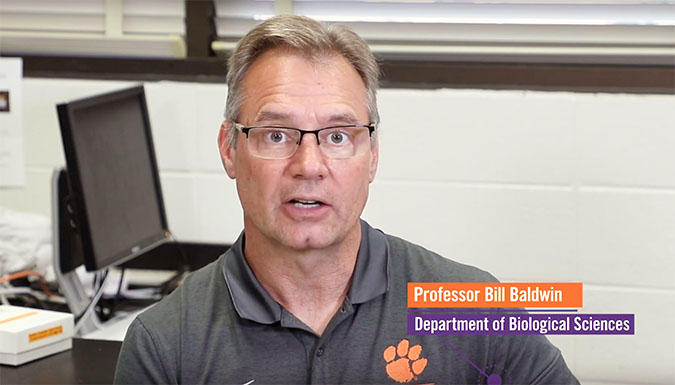
Why Choose Clemson?
EnTox Grad Program Coordinator Welcomes Applicants
The Clemson University Department of Biological Sciences offer two routes for admittance: directly into a faculty member’s lab for M.S. or Ph.D. students, or, for Ph.D. students only, into the graduate program with the intention of conducting up to three lab rotations in the first year. Watch a video from Bill Baldwin, EnTox Grad Program Coordinator and Professor, inviting applicants.
Watch the VideoGraduate Student Financial Support
What financial support is available for graduate students? Graduate students accepted into the biological sciences or microbiology graduate programs are either awarded support through the Department of Biological Sciences as graduate teaching assistants or from individual faculty advisors’ sponsored grant funds as graduate research assistants. GTAs are awarded upon acceptance to the program and may be renewed annually based upon performance in teaching and satisfactory progress towards degree for up to three years for M.S. candidates and five years for Ph.D. candidates. GRAs are awarded by individual faculty advisors from funds available on research grants. GRA support is negotiated by prospective students with individual faculty advisors.
How much does it cost to go to graduate school? Graduate student assistants — GTAs or GRAs — at Clemson University receive tuition remission — graduate assistant differential — either through the University, the department or via sponsored grant funds. Graduate students are, however, responsible for paying graduate student fees each semester to cover library and recreational facility expenses, athletic events, and other services. Fees can be paid during the semesters as payroll deductions and a portion will be removed from the first six paychecks of each semester.
- For current information on graduate tuition and fees, visit the Clemson University Tution & Fees webpage.
Other Financial Support Opportunities
- A limited number of University, diversity or College fellowships are available on a competitive basis for incoming graduate students.
- The college and department provide a variety of research grant and fellowship opportunities for current graduate students, such as the Biological Sciences Professional Development Grants-In-Aid of Research program, dissertation completion fellowships, interdisciplinary fellowships and several graduate program-specific fellowships that recognize excellence.
- The Graduate Student Government offers travel awards of up to $1,000; applications are taken three times a year.
Health Insurance
Health insurance is required for all graduate students and may be purchased through Clemson University. To partially offset some of the health insurance premium costs associated with this requirement, Clemson will provide all graduate assistants (GTAs or GRAs) who purchase health insurance from Clemson with an annual, nonrefundable, nontransferable health insurance subsidy. Graduate students who can document health insurance coverage with a private plan will not have to pay these fees.
